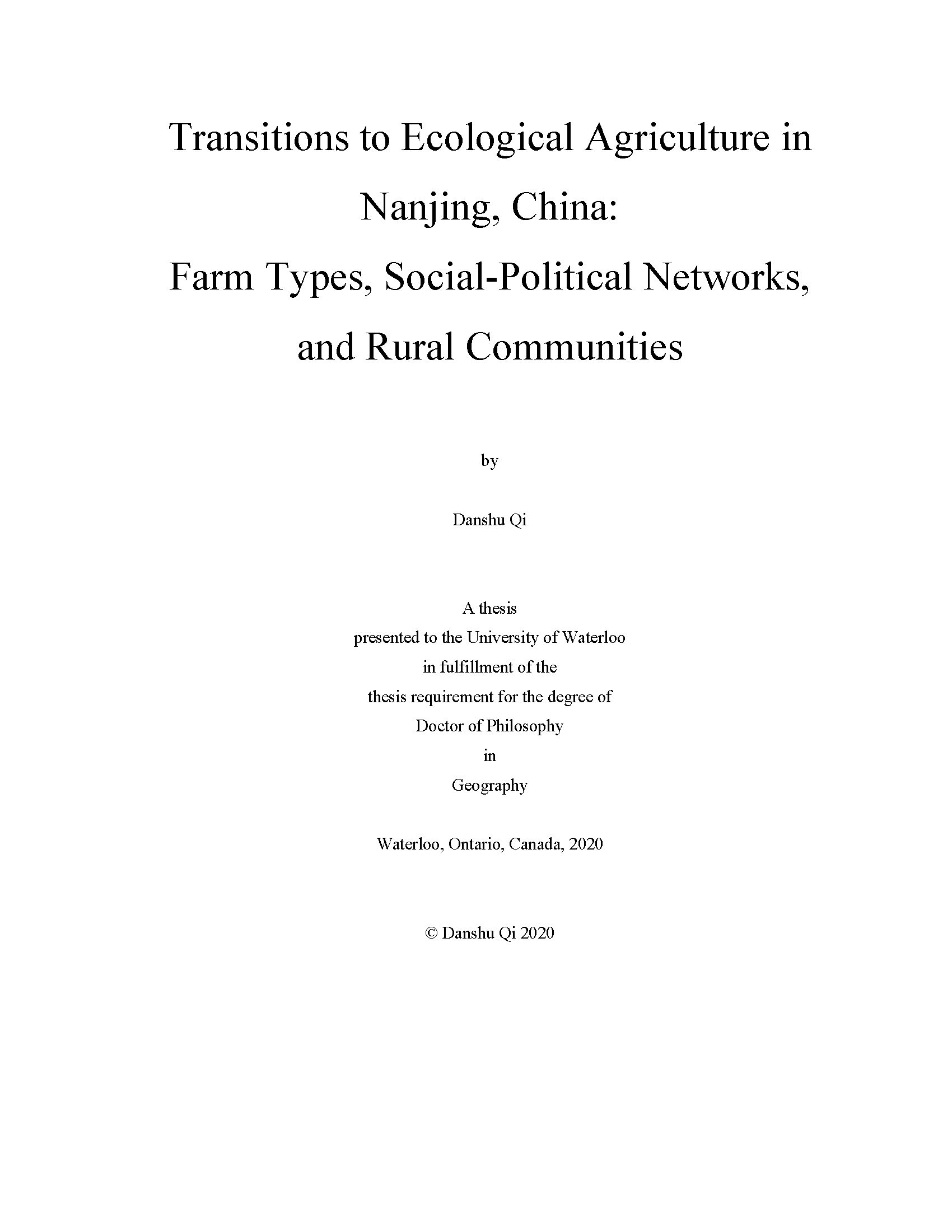– PhD Thesis –
China’s rural and agricultural sector has been undergoing a dramatic transformation in the form of three major trends. First, the modernization and capitalization of agriculture has significantly modified traditional agriculture and exacerbated path-dependency towards an agro-industrial paradigm. Second, the Chinese government at various levels has been promoting an ‘ecological civilization’ that highlights science and technology to address environmental problems. Third, changes that have emerged in the agri-food sector vary from state certification scheme of organic agriculture to grassroots initiated alternative food networks. By delineating the structural changes, previous studies argue that these changes open up possibilities for innovative and sustainable food practices to challenge the mainstream agro-industrial paradigm, and that China stands a chance of witnessing a new post-productivist era in the agri-food sector. Yet, it is unclear how a transition to sustainable agriculture could be formed at the farm-level under the three trends and how the transition is interpreted and implemented by various farmers. This dissertation investigates the ecological agriculture sector in Nanjing, China. It sheds light on the various stakeholders who are the major proponents and leading forces of ecological agriculture, and their practices as shaped by the three interwoven trends. It answers the questions of what ecological agriculture is from the perspectives of Chinese farmers, and what barriers are facing this sector.
The notion of ecological agriculture covers a wide range of farming practices, including organic agriculture, natural farming, biodynamic farming, and other chemical-free farming styles. The first manuscript (Chapter 3) explores ecological agriculture at the farm level. It creates a typology of ecological farms and farmers in Nanjing. This analysis contributes to a conceptualization of ecological agriculture as a range of dynamic practices, evidenced in the evolving farming and management practices. It argues that understanding farmers’ varied attributes is of central importance to elucidate the complexities of ecological agriculture. The second manuscript (Chapter 4) explores the institutional and socio-cultural reasons for the emergence of the ecological agriculture sector in Nanjing. It reveals the vertical relations between farmers and governmental and institutional actors, and the horizontal relations between various farmers. It documents the shifting focus on support for ecological agriculture from local governments and public institutes, and unveils the challenges for different farmers to develop ecological agriculture in the current political and socio-cultural settings. The first two papers suggest a significant urban-rural inequity in opportunities to participate in ecological agriculture, and point out the lack of perspectives from small-scale farmers who join (as vi labourers), rather than initiate (as farm operators), ecological agriculture. Therefore, the third paper (Chapter 5) compares the transitions to ecological agriculture, through a case study in two villages. It highlights how these transitions are accompanied by varied spatial, economic, and social changes that significantly alter rural social patterns. The findings suggest that although both villages have seen land consolidation and income improvement, farmers’ autonomy and relations to land are different. This research thus calls for recognition of the socio-economic values of ecological agriculture in addition to environmental improvement. In addition, this chapter also shows that the current conceptualization of rural restructuring in China overemphasizes the roles of the agro-industrial regime. More work should be added to the rural restructuring concept to uncover the implication of ecological agriculture.
The three papers explore pathways for developing ecological agriculture from different perspectives, i.e., the farm level, the network and relational level, and the village community level. The thesis as a whole argues that ecological agriculture should not be considered as merely governmental schemes to improve environments or initiatives by grassroots actors who seek for food system transitions. Instead, ecological agriculture represents the dynamic outcomes of how different stakeholders are driven by opportunities and confined by barriers. Enabling forces in the development of this sector are associated partly with the governments’ ecological civilization framework that directly changed policy settings by attaching great importance to environmental protection, and partly with growing awareness in the production side that recognize the multiple benefits of ecological agriculture. However, this dissertation also identifies challenges for moving ecological agriculture towards a stronger version of sustainability. The tensions and disconnections between new farmers and rural established farmers should be noted as a structural barrier for ecological agriculture to reach a broader population of producers and consumers. Furthermore, the current business model of promoting ecological transition in the countryside suggests further commercialization of rural land and labour resources. Therefore, the associated processes of altering rural spatial and socio-economic patterns have reinforced the agro-industrial regime and have made it harder for agroecological initiatives to grow. As a result, this thesis from a sociological and human geographical stance illuminates the structural challenges of advancing ecological agriculture in the Chinese context. It calls for critical theorizations of individual-level experiences into studies of ecological agriculture and asserts and applauds key contributions made towards sustainability.

